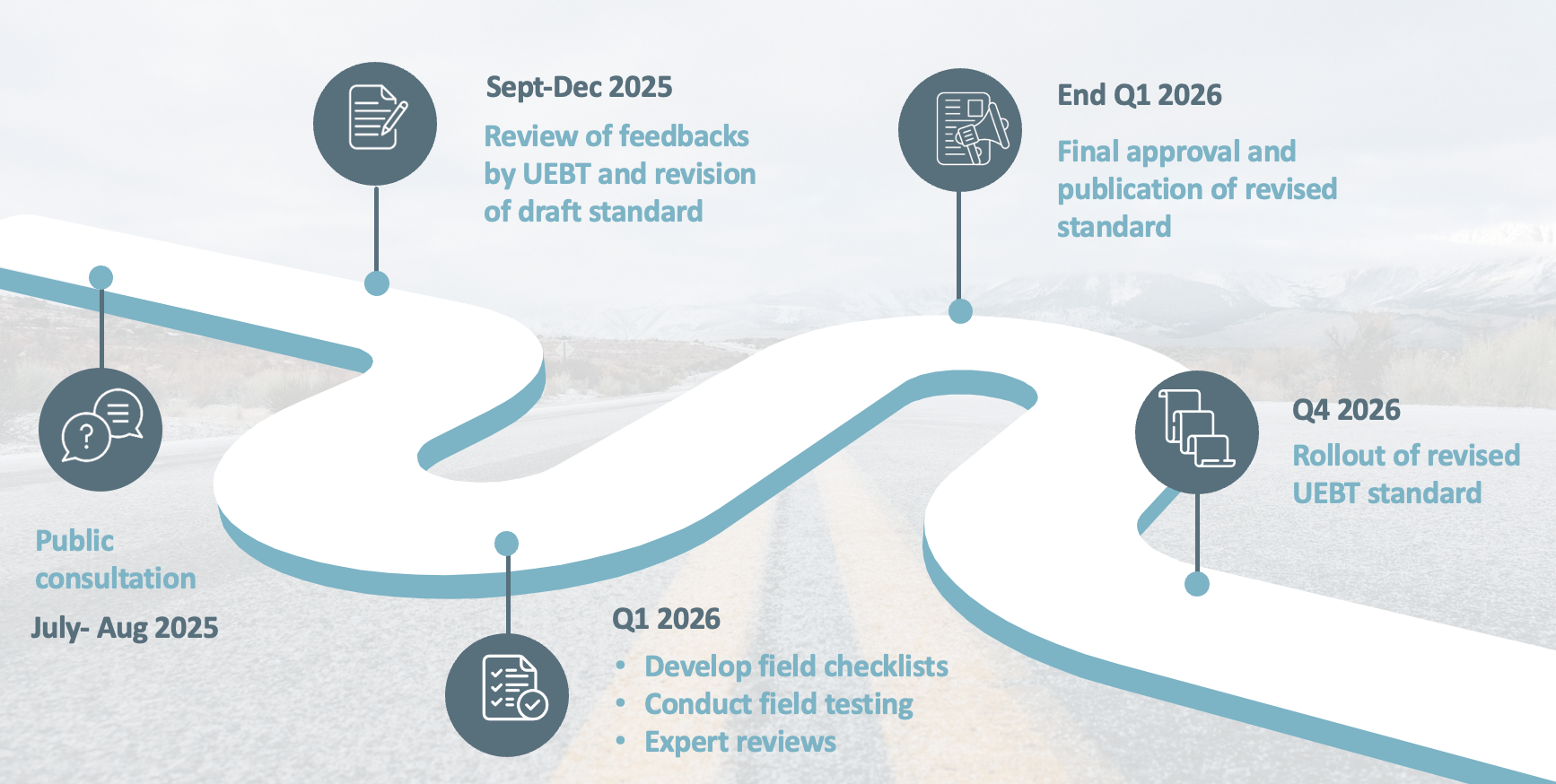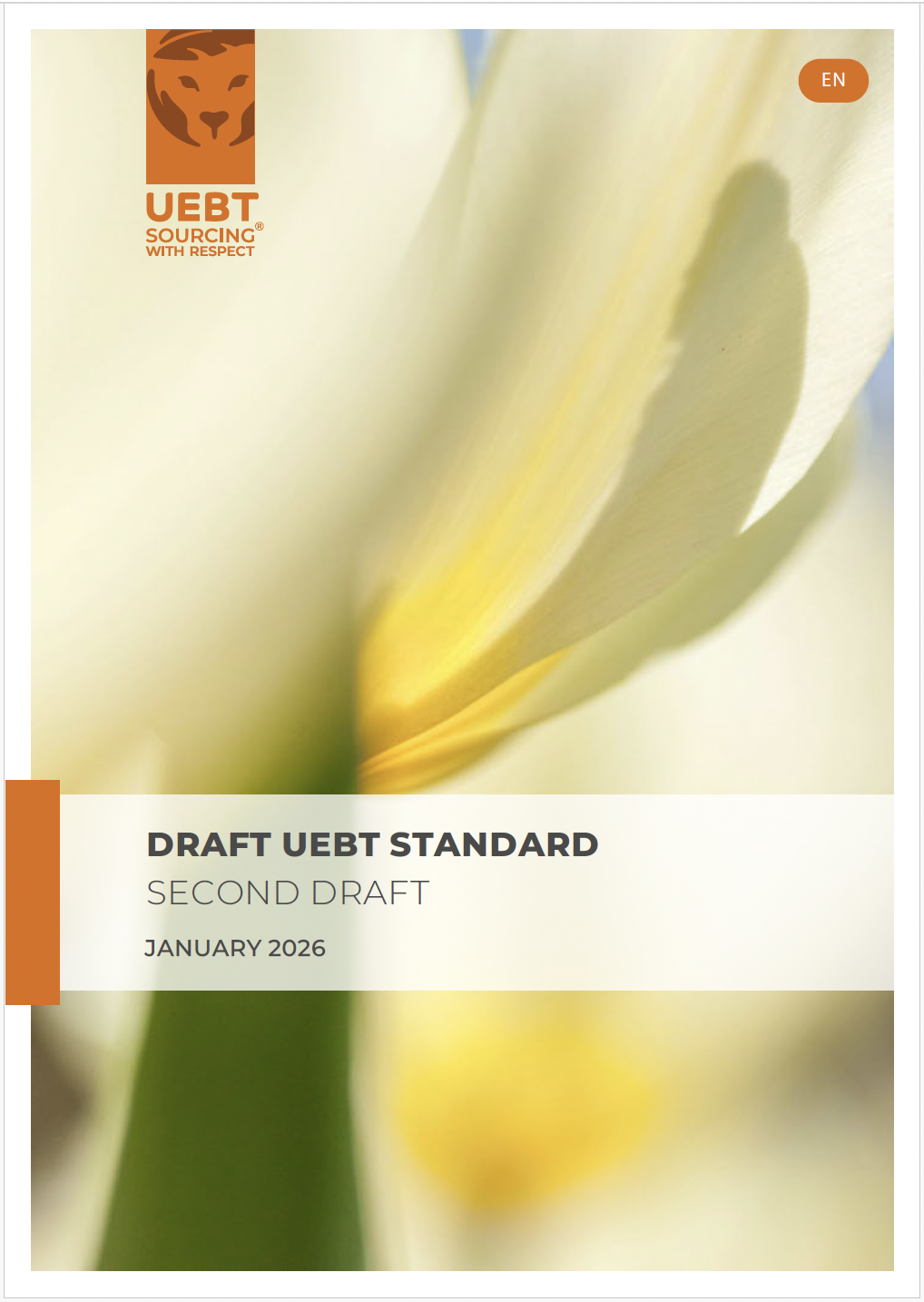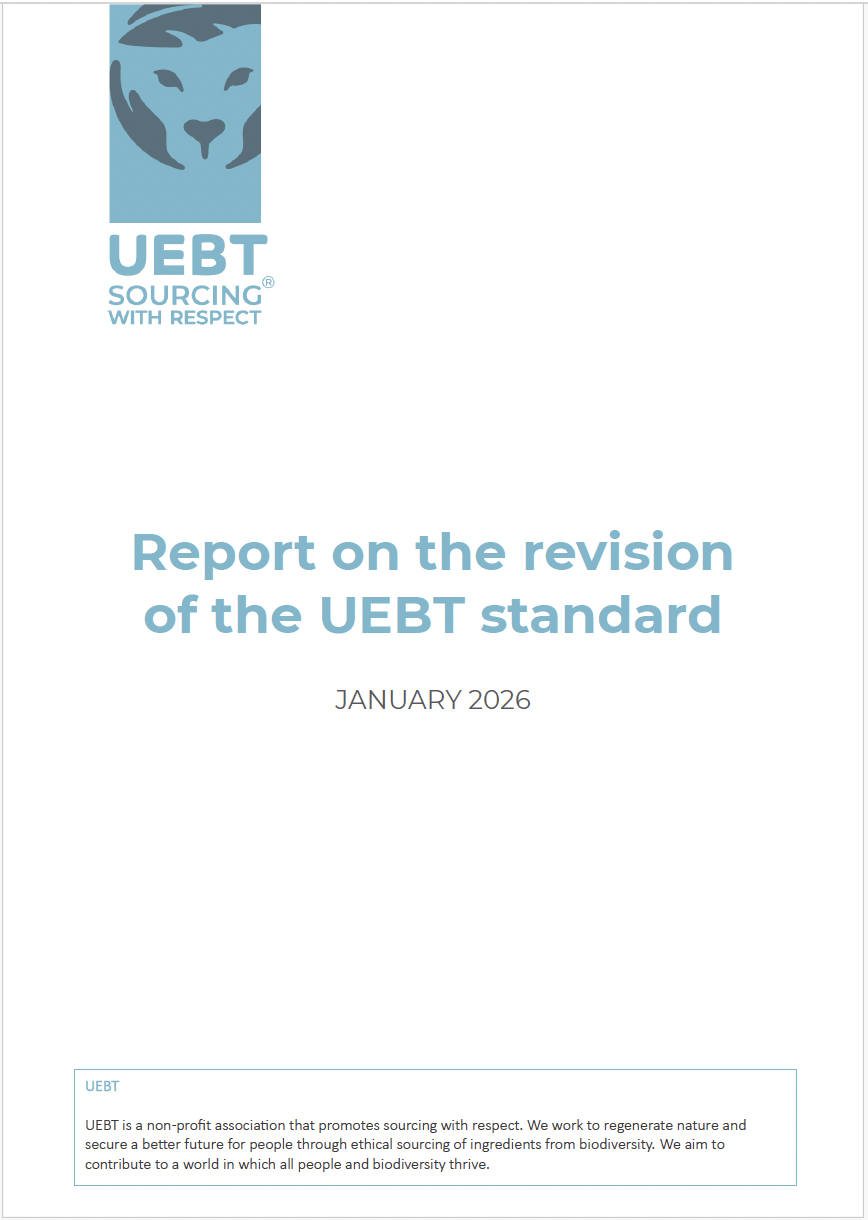UEBT standard revision 2025 - 2026
Background
In line with international best practice and our own standards development procedure, UEBT reviews its standard every five years.
As part of this review we look at:
continued relevance of the standard's outcomes against the UEBT intended sustainability outcomes and impacts as outlined in our Theory of Change, and
continued effectiveness of the standard in meeting its stated objectives as found in our standards’s Terms of Reference.
Results of the review of the standard
The review of the standard was carried out in 2024. We analysed relevant data, information, and learnings from the implementation of the standard since the last revision in 2020. The standard was also discussed with UEBT members at the UEBT members’ exchange in October 2024. The general feedback was that:
The UEBT standard remains fit for its purpose, however significant experience has been gained since its release in 2020.
A revision should focus on clarifying some aspects of the standard, and reducing complexity where needed.
A revision should be based predominantly on the experiences of regular users of the standard.
The standard could be better aligned with evolving regulatory requirements; the most recent UEBT monitoring and evaluation insights; the strategic direction to deepen UEBT’s work on human rights, working conditions, just remuneration and livelihoods; strengthened guidance added to the UEBT field checklist that clarifies current indicators; the continued partnership with Rainforest Alliance on herbs & spices; and the new partnership with SAI Platform on wild-harvested botanicals.
What is under revision in 2025 - 2026
Based on these considerations and feedback, UEBT undertook a limited standard revision focused on improving the standard where needed for clarity, or improved applicability or impact.
The intent was not to introduce completely new topics or to make significant changes to the scope of the standard.
Key considerations for this limited revision were:
promoting long-term economic, social and ecological supply chain resilience,
not significantly increasing compliance thresholds or burdens for organisations using the standard, and
ensuring as much continuity as possible for users.
Objectives of the revision
Consider impacts on supply chain resilience, including economic, social, and ecological factors.
Secure feedback of organisations assessed against the UEBT standard, organisations using the UEBT standard as part of their responsible sourcing strategies, and organisations that have conducted assessments using the standard.
Reduce complexity of the standard where possible without affecting intended impact.
Clarify some indicators to improve auditability or implementation.
Clarify and include any required definitions and indicators to align with relevant international instruments and regulatory requirements.
Where possible, further introduce outcome or impact indicators in order to focus on results.
Strengthen approaches for continued engagement and continuous improvement.
Consult stakeholders on possible unintended effects of the standard.
Timeline
As defined in UEBT’s standards development procedure, at least one round of stakeholder consultation input should be held. This round of input ended on 31 August 2025. All comments received were considered carefully. A summary of comments and how they were addressed is available here.
Contributions
Since its founding, UEBT has offered a platform where companies committed to sourcing with respect for people and biodiversity, can share their experiences and insights, and where other affected stakeholders can also engage.
The public consultation period for this standards revision is now closed. We thank all stakeholders who took the time to share their perspectives and contributions. While the formal consultation is over, UEBT welcomes comments on the standard at any time. Please submit comments to info@uebt.org
Governance bodies and decision making
The UEBT Standard and Assurance Committee oversees the process and recommends approval of the revised standard to the UEBT Board of Directors.
The UEBT Board of Directors evaluates if the revision process it is asked to evaluate is duly followed and endorses the recommendations from the Standard and Assurance Committee.
More information
Description of the UEBT standards development procedure
View the UEBT 2020 standard that will be replaced by the UEBT 2025 standard - also available in French | Spanish | Portuguese | German | Vietnamese
——————————————————
Frequently Asked Questions
-
The public consultation period for this standard revision is now closed. We thank all stakeholders who took the time to share their perspectives and contributions. While the formal consultation is over, UEBT welcomes comments on the standard at any time. Please submit comments to info@uebt.org
-
The draft revised standard has been developed to reduce complexity and, where possible, reduce the number of requirements compared to the 2020 version. The goal is to balance rigour with reducing burdens for small-scale enterprises. UEBT is also focusing on reducing complexity during the development of the UEBT field checklist, a document that provides guidance to auditors and to those entities being assessed on what evidence needs to be considered for each indicator.
-
Our intention is to align with the Rainforest Alliance during the next phase of the UEBT standard revision when we develop our field checklist. The field checklist is used for supply chain assessments in our verification and certification programmes. It includes, for example, guidance for indicators and what evidence should be assessed. In the UEBT/Rainforest Alliance Herbs & Spices Programme there is a separate field checklist that lists the UEBT/Rainforest Alliance requirements. These are based on the UEBT standard and complemented by select Rainforest Alliance requirements. As was done in the previous UEBT standard revision in 2020, UEBT will work with Rainforest Alliance to ensure alignment that fully supports the Herbs & Spices Programme.
-
UEBT has introduced new outcome and impact indicators that have been tested in the field in recent years. The goal of these new indicators is to improve the results of the standard and drive more impact. You will see these various changes in the consultation draft.
-
On the biodiversity side, UEBT has incorporated good practice on how to gather biodiversity information in line with EUDR. On the social side, UEBT has clarified the standard in terms of the process and components of due diligence (including human rights due diligence), in line with international instruments and evolving national requirements.
-
UEBT intends for the standard to be globally applicable, however there are times when we have created sector specific guidance. To ensure local applicability, UEBT held consultation workshops in Brazil, Bulgaria, China, India, Madagascar, Türkiye and Vietnam. For more information, contact your UEBT local representative.
-
The standard will continue to have a continuous improvement approach, with levels of importance of UEBT indicators where some must be addressed with priority, but others where improvements can be incorporated over time (e.g. critical stepwise, regular, regular stepwise). The UEBT’s membership platform is also set up to drive continuous improvement through the conditions and obligations members must follow, including a commitment to continuous improvement and monitoring progress against a three-year workplan, among other actions members take.
-
The process to finalise the UEBT standard involves several steps. After the public consultation closed in August 2025, UEBT carefully reviewed all feedback and incorporated changes where appropriate into the second draft, which is now available on this page. This draft is now being tested in different UEBT programmes and elements further discussed with selected experts and the UEBT Standard and Assurance Committee. These tests and discussions may lead to additional modifications to the standard and will be reflected in the final draft.
Once consensus is reached on the revised standard by The Standard and Assurance Committee, it will be recommended to the UEBT Board of Directors, the Board verifies that the process was correctly followed before endorsing and publishing the standard on the UEBT website.
Once the standard is published, there is still more work to be done to update the UEBT verification and certification programmes. This includes updating auditor guidance, training materials, checklists, and translations.
-
We aim to make the transition process as smooth as possible. For UEBT verification and certification programmes, transition options will be made available, and the 2020 standard will continued to be used for a period of time. Our goal is to give certification and verification clients adequate time to comply. We will share more details on this once the new standard is published.





